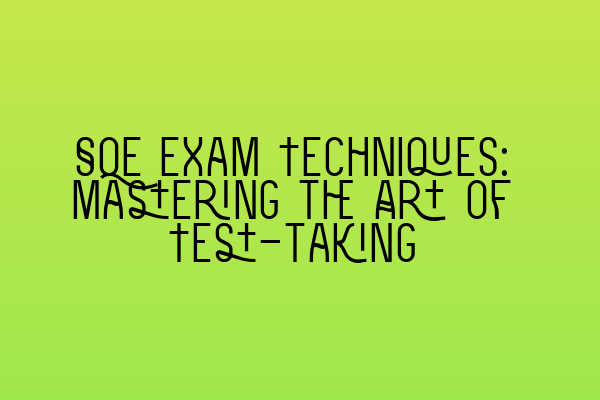SQE Exam Techniques: Mastering the Art of Test-taking
Becoming a solicitor is a dream for many aspiring law professionals. The Solicitors Qualifying Examination (SQE) is a crucial step on the path to achieving this goal. As you prepare for the SQE, it is essential to develop effective exam techniques that will allow you to showcase your knowledge and skills to their fullest potential. In this article, we will discuss some valuable tips and strategies to help you master the art of test-taking for the SQE.
1. Understand the Exam Format
One of the first steps in mastering any exam is understanding its format. The SQE consists of two stages: SQE1 and SQE2. SQE1 is a written exam that assesses your application of legal knowledge to practical scenarios. On the other hand, SQE2 is a skills-based exam that tests your ability to perform various legal tasks. It is crucial to familiarize yourself with the specific requirements and structure of each stage, as this will allow you to tailor your preparation accordingly.
2. Create a Study Plan
Proper planning is key to exam success. Create a study plan that is structured and realistic. Allocate specific time slots for studying different topics and make sure to prioritize areas that require more attention. Be consistent in your study routine and set achievable goals for yourself. Breaking down your study into manageable chunks will prevent overwhelm and improve your overall focus.
3. Practice with Mock Exams
Mock exams are invaluable resources when preparing for the SQE. They simulate the exam experience and allow you to assess your progress. Practice answering questions under timed conditions to get a feel for the pacing required during the actual exam. By incorporating mock exams into your study routine, you will become more familiar with the exam format and improve your ability to apply legal knowledge effectively.
Check out our Interactive SQE Mock Tests for Property: Sharpen Your Skills for Exam Success to access high-quality mock exams specifically tailored for the property law section of the SQE.
4. Review Past Papers
Reviewing past papers is an excellent way to understand the types of questions that might appear on the SQE. Analyze the structure and content of previous exams to identify patterns or recurring themes. This will help you become familiar with the style of questions and enable you to tailor your answers accordingly. Additionally, reviewing past papers will highlight any gaps in your knowledge and allow you to focus your revision on areas that need improvement.
5. Develop Effective Time Management
Time management is crucial during the SQE, as you will have limited time to complete each section of the exam. Practice allocating your time wisely during mock exams to ensure that you can address all questions within the given timeframe. Develop techniques such as skimming through questions before diving into answers and prioritizing more challenging questions. By mastering time management, you can avoid unnecessary stress during the actual exam and maximize your chances of success.
6. Apply Critical Thinking
The SQE requires not only a solid understanding of legal principles but also the ability to apply critical thinking skills. During the exam, carefully analyze the given scenarios and consider all possible angles before formulating your answers. Think critically about the legal issues at hand, identify relevant laws or precedents, and articulate your reasoning clearly. Develop a structured approach to problem-solving, which will help you present well-reasoned arguments in your exam responses.
7. Seek Professional Guidance
Preparing for the SQE can be challenging, but you don’t have to do it alone. Consider seeking professional guidance or enrolling in a comprehensive SQE training program. These programs provide expert advice, resources, and support to help you navigate the exam confidently. They can offer tailored study materials, personalized feedback, and valuable insights into the examiners’ expectations. By working closely with experienced professionals, you can refine your exam techniques and boost your chances of achieving a successful outcome.
For more information on SQE preparation, essential tips, and resources for success in property practice, check out our related article: SQE Prep: Essential Tips and Resources for Success in Property Practice. This article provides valuable insights specifically tailored for aspiring property law professionals preparing for the SQE.
Additionally, if you are interested in understanding land charges, their implications, and considerations for the SQE, we recommend reading our article: Examining Land Charges: Implications and Considerations. This article delves into important aspects of land charges that may be part of the SQE exam.
Are you looking for interactive SQE mock tests to sharpen your skills for the property law section of the exam? Take a look at our informative article: Interactive SQE Mock Tests for Property: Sharpen Your Skills for Exam Success. This resource provides access to comprehensive mock tests designed specifically to prepare you for the property law section of the SQE.
Lastly, if you are interested in gaining an in-depth understanding of residential leases and their legal implications, check out our article: An In-Depth Look at Residential Leases. This article covers key aspects of residential leases that may be essential for the SQE.
To better understand the legal considerations related to joint ownership of property, don’t miss our informative article: Joint Ownership: Legal Considerations for Co-Owners of Property. It provides valuable insights into this topic, which could be relevant to the SQE.
In conclusion, mastering the art of test-taking for the SQE involves understanding the exam format, creating a study plan, practicing with mock exams, reviewing past papers, developing effective time management, applying critical thinking, and seeking professional guidance. By implementing these strategies, you can enhance your preparation and increase your chances of achieving success on the SQE. Good luck!

Leave a Reply